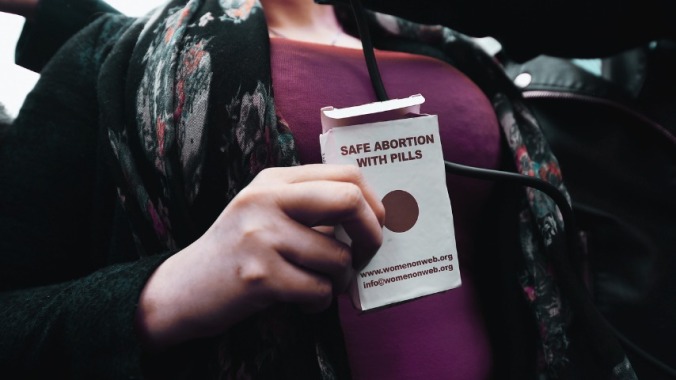Postpartum Care in Louisiana Threatened After State Officially Criminalizes Abortion Pills
Doctors in the state warn the new law could worsen the state’s maternal mortality crisis since the pills are also used for a wide range of medical situations. One patient who was denied an emergency abortion in 2022 said the law “literally keeps me up at night.”
Photo: Getty Images AbortionPolitics Abortion
A new law in Louisiana criminalizing medication abortion—and, consequently, rendering the life-saving medication for postpartum hemorrhage much more difficult for doctors to access in the state’s hospitals—took effect on Tuesday.
The law, which Gov. Jeff Landry (R) signed in May, adds the most common medication abortion pills (mifepristone and misoprostol) to the state’s controlled dangerous substances list as a Schedule IV drug—even though a substance must be addictive to be classified as such. Anyone in possession of the drug without a prescription could face prison time. The law offers a supposed exception for pregnant people who are imminently about to use the pills to terminate a pregnancy, but Pregnancy Justice warned Jezebel in May that it’s unclear how law enforcement would determine this.
But abortion pills are used in a range of medical situations, from treating miscarriages to aiding IUD insertions. The World Health Organization classifies misoprostol as an essential medication to stop life-threatening postpartum hemorrhaging, which is a leading cause of maternal mortality. “This is not about medicine. This is not about science. This is not about safety. Attempts by states like Louisiana… are intended to punish and control those seeking reproductive health care services,” Dr. Jamila Perritt, president and CEO of Physicians for Reproductive Health, told Jezebel. “Access to medications used in abortion care, like mifepristone and misoprostol, should be expanded, not restricted.”
Now, Louisiana hospitals will no longer be able to carry the medication on birthing carts to ensure that patients can receive it as quickly as possible. Instead, at least one major Louisiana hospital system—Ochsner Health—specified last week that all health care providers will need to detail why they’re prescribing or seeking misoprostol and, in cases of emergency, they’ll have to follow an override system to allow misoprostol to be released from the locked cabinet.
Dr. Jennifer Avegno, an emergency physician and director of the New Orleans Health Department, told CNN on Tuesday that fellow health providers in her state have been doing drills to practice obtaining misoprostol from locked cabinets in emergencies. “It adds several minutes to that process,” she said. “If you’ve ever watched someone bleed out after childbirth, as I have, you know that minutes can make a difference.” She told NBC News that “in the setting of a life-threatening hemorrhage, minutes are really important.”
-

-

-

-

-

-

-

-

-

-

-

-

-

-

-

-

-

-

-

-

-

-

-

-

-

-

-

-

-

-

-

-

-

-

-

-

-

-

-

-








































